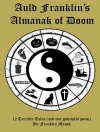In her groundbreaking novel, ‘Frankenstein, ‘ Mary Shelley weaves a rich tapestry of Gothic horror intertwined with profound philosophical inquiry. Through the tragic story of Victor Frankenstein and his monstrous creation, Shelley explores themes of ambition, the quest for knowledge, and the ethical implications of scientific endeavor. Written in the early 19th century, amidst the backdrop of the Industrial Revolution and Romanticism, the book employs a structured narrative style, blending epistolary elements with vivid descriptions that evoke both sympathy and terror. Shelley’s literary craftsmanship challenges the boundaries of nature and humanity, making the work a precursor to both science fiction and existential literature. Mary Shelley, often heralded as the mother of science fiction, crafted ‘Frankenstein’ at a remarkably young age during a summer in 1816 spent in Switzerland with Lord Byron and Percy Bysshe Shelley. The intellectual exchanges and personal tragedies surrounding her life, including the death of her mother and her tumultuous relationship with Percy, deeply influenced her exploration of creation, loss, and the human condition. Her unique perspective as a woman writer in an era dominated by men adds an essential layer of critique regarding gender roles in both science and society. ‘Frankenstein’ is a must-read for anyone interested in the philosophical dilemmas posed by scientific advancements and the responsibility that comes with creation. Shelley’s work remains profoundly relevant, prompting readers to reflect on the consequences of humanity’s relentless pursuit of knowledge and the moral questions it raises. Dive into this timeless exploration of creation and consequence, and discover the unsettling yet thought-provoking narrative that continues to capture the imagination.
เกี่ยวกับผู้แต่ง
Mary Wollstonecraft Shelley (1797–1851) was an English novelist, short story writer, dramatist, essayist, biographer, and travel writer. She is best known for her classic Gothic novel, ‘Frankenstein; or, The Modern Prometheus, ‘ published in 1818. Shelley was born to philosopher and journalist William Godwin and famed feminist Mary Wollstonecraft, although her mother died shortly after her birth. Her upbringing in this household of intellectuals significantly influenced her literary development. In 1814, she commenced a tumultuous relationship with the poet Percy Bysshe Shelley, whom she married in 1816 after his wife’s death. The idea for Frankenstein was born in 1816 while she was staying near Geneva with Percy, Lord Byron, and other literary figures. They decided to have a competition to write the best horror story, which led Mary to conceive the idea for what would become her most famous work. Frankenstein is notable not only for its famous monster but also for its exploration of human nature, creation, and responsibility, making it one of the earliest examples of science fiction. Though Frankenstein is her most famous work, Shelley’s writing career was prolific, producing novels like ‘The Last Man’ and travel writings such as ‘History of a Six Weeks’ Tour.’ Her literary style combines elements of Romantic and Gothic literature, focusing on the role of the individual in society and emotions. Mary Shelley’s influence on literature is immeasurable; her work not only launched a new genre but also continually sparks discussions on science, ethics, and the nature of creation.












